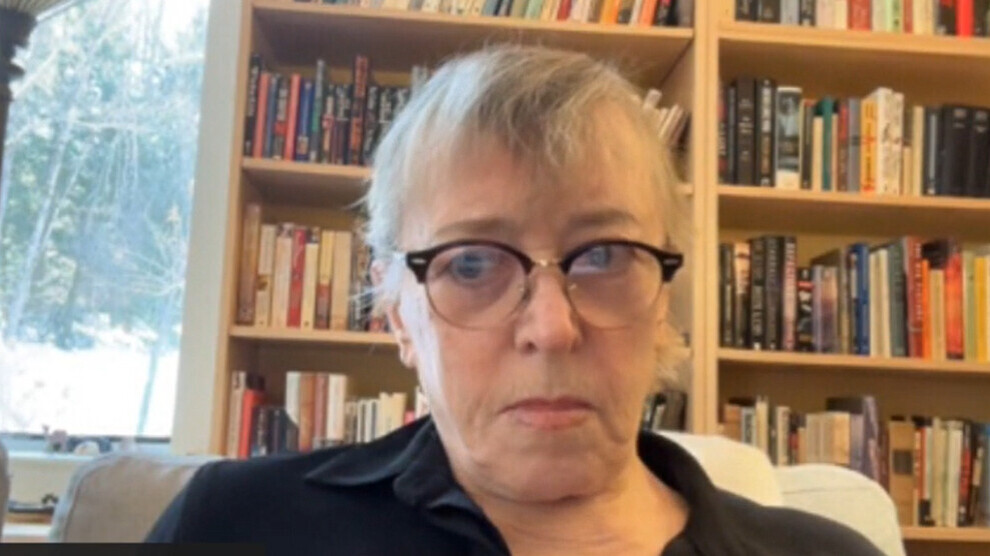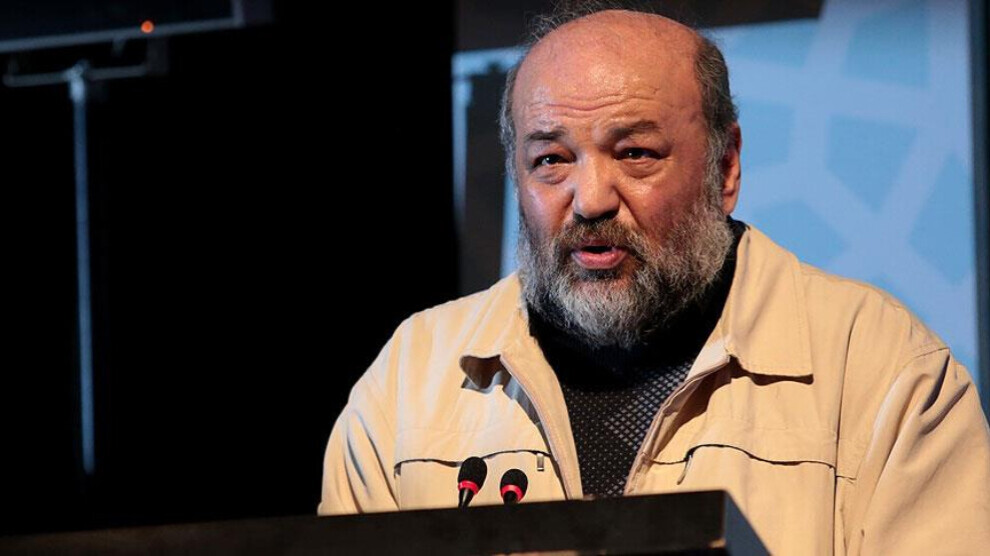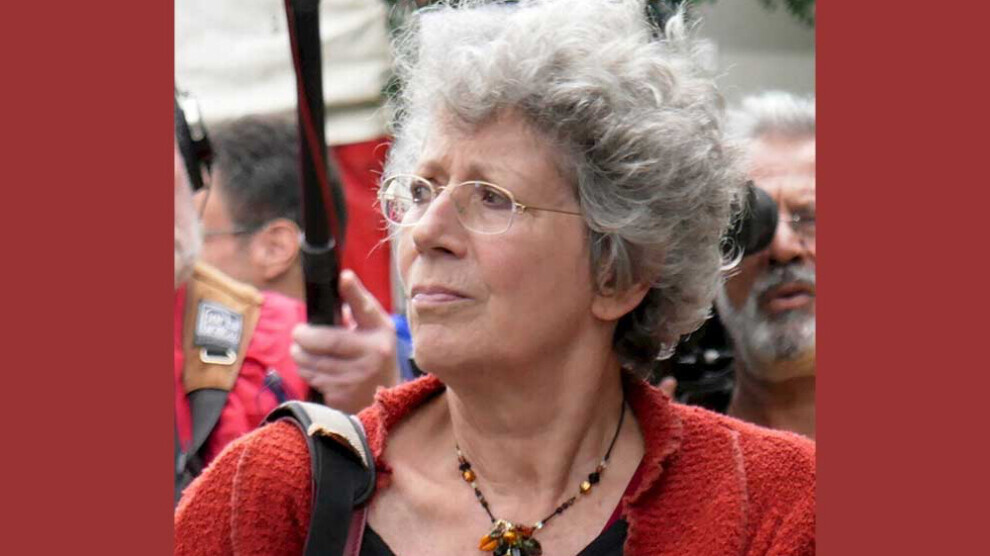Nobel Peace Prize winner and human rights activist Jody Williams said that Öcalan's efforts for peace were inspiring.

ANF
NEWS DESK
Tuesday, 4 March 2025
VIDEO INTERVIEW
Nobel Peace Prize winner and human rights activist Jody Williams told Medya Haber TV journalist Erem Kansoy that Abdullah Öcalan's call for peace was an extremely positive development in the context of increasing war and genocide around the world.
Williams said: "It is inspiring to see Abdullah Öcalan wanting to move towards peace," and added that this process should be supported.
Williams continued: "The necessary conditions must be provided for him to be able to do what he says and participate in the process. Öcalan must be provided full security as a leader who is fully involved in this process."
Williams said that Öcalan would be a perfect candidate for the Nobel Prize.
Eliaçık: Öcalan's call represents an ideological jump forward
Writer Ihsan Eliaçık said that Abdullah Öcalan's Call for Peace and Democratic Society does not represent a retreat but rather an ideological jump forward.

ANF
ISTANBUL
Sunday, 2 March 2025
Abdullah Öcalan’s historic call continues to be discussed both in Turkey and internationally. While different groups debate the statement and its implications.
Writer Ihsan Eliaçık told ANF that he "does not see Öcalan’s call as a retreat. On the contrary, it represents an ideological step forward. Even if he were not in prison, this call demonstrates a high intellectual performance, a re-reading of history, and deep historical analysis. He has moved beyond concepts like separate nation-states, autonomy, and cultural rights, and is advocating for a comprehensive democratic transformation. He envisions a system not based on any particular faith, ethnicity, sect, or individual but rather on the will of a democratic society. In such an environment, he believes Kurds can express themselves freely. These are straightforward radical democratic demands."
Eliaçık noted that those with strong nationalist feelings initially responded with emotional rhetoric and added that their adaptation to the process would take time. He said: "The adaptation of nationalist circles to this process may take quite some time. Everyone is trying to steer events in a direction that serves their own interests in response to these new developments. Öcalan is observing both internal and external developments and is guiding them according to his own paradigm. He is looking for ways to make the most of this process."
Radical democracy would end Turkish dominance in the state
Eliaçık pointed out that Turkish nationalists are the least prepared for this process, explaining that the desired radical democracy would affect them the most. He said: "The group least prepared for this process is Turkish nationalists. Because radical democracy would put an end to Turkish dominance in the state but, at the same time, it would not allow for Kurdish dominance either. It does not foresee the supremacy of any particular group outside the will of a democratic society: rather, it makes everyone truly equal."
Journalist Lefevre: Rojava is the future of democracy
Journalist Gabrielle Lefevre said that protecting Rojava and its model is a duty for all, as it faces the threat of genocide.

SERKAN DEMIREL
BRUSSELS
Monday, 3 March 2025
The Turkish state and its affiliated armed groups continue their attacks on the Autonomous Administration regions of Northern and Eastern Syria. In these air and ground assaults, civilians, including women and infants, are deliberately targeted and killed. Since the beginning of the occupation, war crimes and crimes against humanity have been systematically committed in the occupied regions of Afrin (Efrîn), Girê Spî, and Serêkaniyê.
The crimes perpetrated by the Turkish state in North and East Syria and the occupied territories were examined by the Permanent Peoples’ Tribunal (PPT), which convened in Brussels, Belgium, on February 5-6. This session, held under the name "Rojava Peoples’ Tribunal," included Gabrielle Lefevre, a renowned Belgian journalist and human rights advocate, as part of the panel of judges.
ANF spoke with journalist Gabrielle Lefevre, who has deep knowledge of the Middle East, about the crimes committed by the Turkish state in North and East Syria, the Rojava model, and the international community's silence in the face of these events.
You were part of the panel of judges at the Rojava Peoples’ Tribunal, held in Brussels, Belgium, on February 5-6. What would you say about the importance and purpose of this tribunal?
As long as the international community remains incapable of upholding international law, especially human rights, and given that the situation in Rojava is catastrophic, nearing the level of genocide, a reality that is scarcely known and barely disseminated, the PPT serves as the voice of citizens and oppressed peoples.
This is a tribunal of global citizens who reject the massacres in Rojava and the domination of peoples by a state. It is a court for those who have no other means of defense, for communities that, at the very least, need the solidarity of other peoples and individuals. This is what makes the PPT extraordinarily important.
Having followed the tribunal’s work for decades, I can say that it plays a crucial role in exposing injustices and the extreme oppression inflicted upon peoples.
Crimes amounting to genocide are being committed
You previously made a preliminary statement regarding the tribunal’s decision. Have you finalized the tribunal’s rulings?
We have already announced a preliminary ruling regarding the tribunal’s stance. At the moment, we are working with the other judges to draft the final verdicts, which will be thoroughly substantiated with detailed justifications.
However, our preliminary conclusions were very clear. Every case presented and supported by the prosecutors was backed by solid evidence. It has been unequivocally established that war crimes, crimes against humanity, and acts nearing the level of genocide are taking place.This situation bears striking parallels to what is happening in Palestine. If this continues unchecked, the completion of this genocide will be inevitable. Therefore, international intervention is imperative; otherwise, we will witness a genocide unfolding helplessly before our eyes.
One of the greatest failures of democracy today is its incapacity to prevent genocides. Yet, we possess all the necessary evidence. I personally verified the evidence presented by the prosecutors through independent sources, and everything was confirmed to be true.
What is even more alarming is that the ruling authorities in Turkey, including the president and ministers, sometimes openly boast on social media about actions that are undeniably criminal, falsely framing them as "counterterrorism operations." This claim is entirely misleading. However, their own admissions serve as further proof that these crimes are indeed happening. At this point, we are facing an arrogance of power that believes it can manipulate public perception. They are actively working to shape Turkish public opinion and preemptively counter international criticism.
Reports confirm the crimes
Are you basing your conclusions about war crimes and crimes against humanity solely on the evidence presented by prosecutors and lawyers in the tribunal? Was it difficult for you to reach this decision, or did you consult other sources?
The facts are undeniable, and the evidence is clear. There are numerous reports from major international organizations, including the United Nations (UN), Human Rights Watch (HRW), and Amnesty International. These institutions cannot be bought or manipulated; they have proven their credibility and expertise over decades. In addition to the tribunal’s own investigations, we thoroughly examined reports from these organizations. The findings were entirely consistent with the evidence presented by the prosecutors.
Resistance against occupation
Turkish officials claim they are conducting a fight against "terrorism" in North and East Syria. This narrative is repeatedly used to justify these crimes. What are your thoughts on this approach?
This is the exact same rhetoric that the Israelis use against Palestinian resistance fighters. Resistance against occupation is labeled as terrorism. What is happening in Syria, and particularly in Rojava, is a struggle against an occupying force. It is not terrorism. During World War II, European resistance fighters who stood against the German occupation were also branded as terrorists by the Nazis. But in reality, they were freedom fighters. In certain situations, resistance, including armed resistance, becomes a necessity.
Turkey is directly responsible
Some human rights organizations, including those you mentioned, suggest in their reports that the crimes committed in the occupied territories are the responsibility of Turkish-backed armed groups rather than the Turkish state itself. Does the fact that these crimes are carried out by such groups absolve Turkey under international law?
These militias, or what we call "proxy fighters," are directly protected by Turkey. They are armed, commanded, and answer directly to the Turkish state. In reality, it is the Turkish Minister of Defense who coordinates and organizes these forces. The fact that the occupied regions are administered by Turkey, that everything operates in Turkish, that the official currency is the Turkish lira, and that security, or rather repression, is enforced by militias acting under direct orders from the Turkish government makes the situation unmistakably clear.
Moreover, the high-performance military equipment used (drones, warplanes) belongs to the Turkish army, as evidenced by the prosecution's findings. These militias are not independent actors; they function as extensions of the Turkish military or as remnants of radical militant groups now operating under Turkish command.
Erdoğan draws strength from international silence
As you mentioned, the Turkish state is deliberately targeting civilians and civilian settlements, directly violating international law. Yet, the international community remains largely silent. How do you interpret this silence and impunity toward Turkey?
This is precisely what the PPT aims to highlight: raising awareness. However, the current geopolitical landscape is so complex that even the UN is powerless, and President Erdoğan knows this very well.
Erdoğan, with incredible cunning and recklessness, continues to defy international law while intensifying pressure on Rojava. His goal is to dismantle the democratic, self-governing model in Rojava, which is based on gender equality. This model poses a direct threat to the authoritarian, religiously driven, and conservative Turkey he envisions.
The international community has already demonstrated its complete inability to prevent genocide in Palestine or stop Israeli expansionism from redrawing territorial borders. Lebanon has suffered and continues to suffer, while Syria remains partially occupied by Israel, all of this happening with total impunity.
At the same time, on the other side of Syria, Turkey carries out its attacks in a more covert manner yet follows the same principles, violating the most fundamental and sacred laws of civilization. The Geneva Conventions and international law as a whole are being entirely disregarded. These values are being trampled in the same reckless manner as we see with Israel, which is backed by the United States, and a vision of a world where only the strongest, wealthiest, and most powerful dictate the law while fundamental rights are ignored. This is exactly what is happening almost everywhere. That is why we, as citizens, must remind people by every possible means that it is we, the people, who are the true bearers and defenders of the law.
We must take action
The law derived from the Universal Declaration of Human Rights does not belong to the powerful. It is simply the law; a recognition of our profound humanity, a set of universal rights from which everyone benefits equally. It is our duty to constantly remind the world of this.
We may seem weak, but in countries where democracy still exists, we hold significant power. In the end, it is we who vote. It is we who hold members of parliament accountable and question them. On the other hand, a delegation from the Permanent Peoples’ Tribunal will listen to what has happened and what has been said in the European Parliament. Perhaps they will draw conclusions for the future of Europe’s relations with Turkey.
We hope that parliamentarians will awaken and truly defend the rights of this people. No people, especially the Kurds in Rojava, deserve the persecution they are subjected to today. No people deserve this. No one. Such oppression has never been considered legitimate, neither throughout history nor under any framework of international law. No one has ever justified such an injustice.
No comments:
Post a Comment